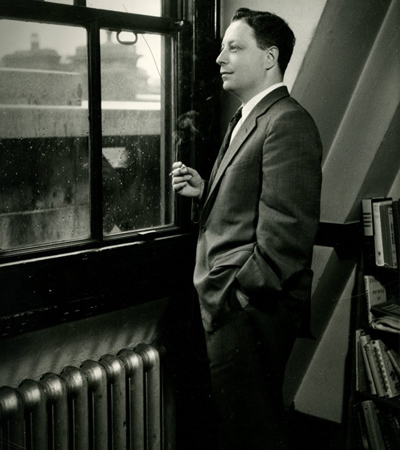
Biography
Irving Kristol (1920–2009), one of the great essayists, editors, and public intellectuals of the twentieth century, was at the center of a transformative force in American politics and thought: neoconservatism. His own writings, as well as his founding and editing of the important quarterly, The Public Interest, were crucial to the emergence of that movement—or “persuasion,” as he called it. But even if neoconservatism never had come into being, Kristol would be remembered for his more than sixty years of wide-ranging and trenchant commentary on a remarkable number of subjects.
Kristol was born on January 22, 1920, in Brooklyn, and lived most of his life in New York City. He received a B.A. from the City College of New York in 1940. While at City College—then known as the “Harvard of the Proletariat”—Kristol participated in political discussions in Alcove One with future collaborators Daniel Bell, Nathan Glazer, and Seymour Martin Lipset. Kristol met his wife, Gertrude Himmelfarb, at a Trotskyist meeting in Brooklyn. They married in 1942.
Kristol’s earliest work can be found in Enquiry: A Journal of Independent Radical Thought, a small magazine he started with a few friends shortly after college. After serving as an infantryman on the European front in World War II, he joined Commentary as managing editor. In 1953, Kristol (along with his wife who had completed a Ph.D. in British intellectual history) moved to London, where he founded and edited the distinguished journal, Encounter, with the poet Stephen Spender. The Kristols moved back to the United States in the late 1950s. He first edited the biweekly magazine, The Reporter, served as executive vice president of the publishing house, Basic Books, from 1961 to 1969, and became the Henry Luce Professor of Urban Values at New York University from 1969 to 1987. From 1988 to 1999, Kristol was the John M. Olin Distinguished Fellow at the American Enterprise Institute.
Along with Daniel Bell, Kristol founded The Public Interest in 1965. It would soon blend economics, sociology, and political philosophy into a critique of Johnson’s Great Society, the New Left, and the urban social policy of the 1960s that paved the way for the Reagan Revolution and modern conservatism. As a complement to The Public Interest, Kristol founded and served as publisher of The National Interest, a foreign-policy quarterly, from 1985 until 2002. He also wrote an influential monthly column for The Wall Street Journal for over two decades.
Many of Kristol’s essays were collected in various volumes: On the Democratic Idea in America (1972), Two Cheers for Capitalism (1978), Reflections of a Neoconservative: Looking Back, Looking Ahead (1983), Neoconservatism: An Autobiography of an Idea (1998), and the posthumous The Neoconservative Persuasion: Selected Essays, 1942–2009 (2011). A festschrift on the occasion of Kristol’s seventy-fifth birthday in 1995 was edited by his son, William Kristol, and Christopher DeMuth: The Neoconservative Imagination: Essays in Honor of Irving Kristol.
In 2002, George W. Bush awarded Irving Kristol the Presidential Medal of Freedom, the nation’s highest civilian award.
